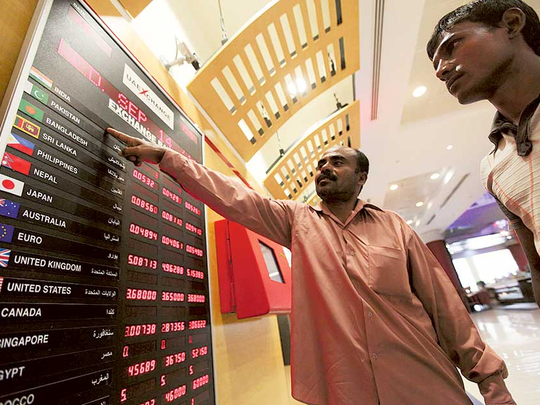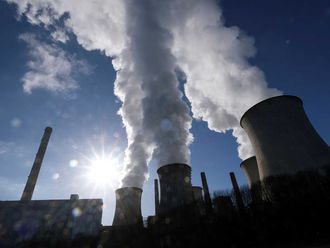
Exchange rates involve two sides, by definition. So while the euro might not seem the most obvious concern for readers in the Gulf, its troubles can be reflected in the US dollar, the other half of the heaviest trade in the world’s foreign exchange markets.
So much has been said and written already about the Greek situation that it’s better just to wait for the outcome of Sunday’s referendum, and the twists and turns that can still arise whatever the result, especially given the disputed nature of the question being asked.
At this moment the inherent weakness of the continent’s monetary union, in common with the relative weakness of the European economy itself, contrasts with expectations of a gradually strengthening US dollar.
As well understood, that has double-edged implications for oil prices, and the growth prospects for the GCC states, in terms of the trade-off between higher receipts per barrel but subsequently lower level of demand from non-dollar-based customers.
Oil prices, like asset markets, conspicuously have shown little positive movement recently, settling into a roughly sideways or defensive range.
The likely shifting of the US$/euro rate — over time rather than at any given moment or for a limited timespan — is justified, for instance, by analysis lately offered by BofA Merrill Lynch Global Research.
Its study says the “longer-term fundamentals for dollar upside are in place”, leading potentially to parity (a value of 1:1) with the euro by year-end and into 2016. That’s based on the cyclical interest-rate and yield comparison and the substantially shale-driven, structural improvements to the balance of payments (which are boosted too by the improving returns generated from US investments overseas).
The euro might still surprise, though, particularly if Greece capitulates and accepts EU dominance over its affairs, with core countries like Germany very much at the helm.
Global financial crisis
Yet, as another essentially financial factor — just like stocks and bonds, in their detachment from much of an economic grounding — how would the underlying, real economy be affected?
Probably more so than in the Gulf, where the dollar benchmark has provided a certain shelter.
In that regard, a recent report by Business Monitor International on the UAE economy could be taken to suggest that not a lot has changed in the course of a whole decade, for all the chaos that emanated from the global financial crisis.
Ten years ago the research company foresaw relatively rapid economic growth, in the 4-5 per cent range, based on “impressive, broad-based” momentum in manufacturing, services and construction, irrespective of high oil prices. That was attributed to an “enlightened strategy” of development that would keep the country advancing quicker than its regional peers.
Would you expect very different remarks now? It’s as if the credit crunch had never happened, although we know a significant debt burden has accumulated in between times.
BMI’s latest view maintains a “bullish outlook” despite lower oil prices, owing to “substantial fiscal buffers … and construction projects [that] will continue apace”. Most hearteningly, “growth will be powered by the non-oil sector … [as] a host of leading indicators point to further expansion”. Measures to promote fiscal consolidation, now emerging, should underpin those efforts.
It’s not as if the international environment has helped particularly. Besides the post-crisis slump in activity, policymaking has at best had mixed success among the key blocs.
Without retelling that tale, the deficiencies of reinforcing the mistake of very easy money have become apparent, leading to warnings like that from the Bank for International Settlements (the ‘central bank’s bank’) that should put investors on their guard.
General economic health
One of the many items on that list is the damage done to banks’ earning power, at a time when they need to restore their balance sheets and profitability, and governments to step away from the vulnerable position of guaranteeing them.
EFG Hermes has argued, for instance, that a rise in US interest rates, long-awaited, would ease matters for Mena banks which “have been under pressure due to sustained compression in net interest spreads”.
It’s a reminder that, if and when that rate hike comes, it might not be as bad news for general economic health as straight-line projections of monetary policy’s impact upon growth might have you believe.
Who knows, it might also have been so discounted by then that the collective reaction could be the clearest example yet of the well-known ‘buy the rumour, sell the fact’ phenomenon. For sure, any sign of a move towards normalisation in policy settings, and away from scare stories of deflation and trading tantrums, might just invoke a much-needed sigh of relief.
Still, we’ll need to know in the meantime whether Greece is really prepared to bring the united European house down, or, one way or another, to accept and comply with the terms that are meant to keep the euro and its member countries in place. Those really are shaky foundations to be resting on.












